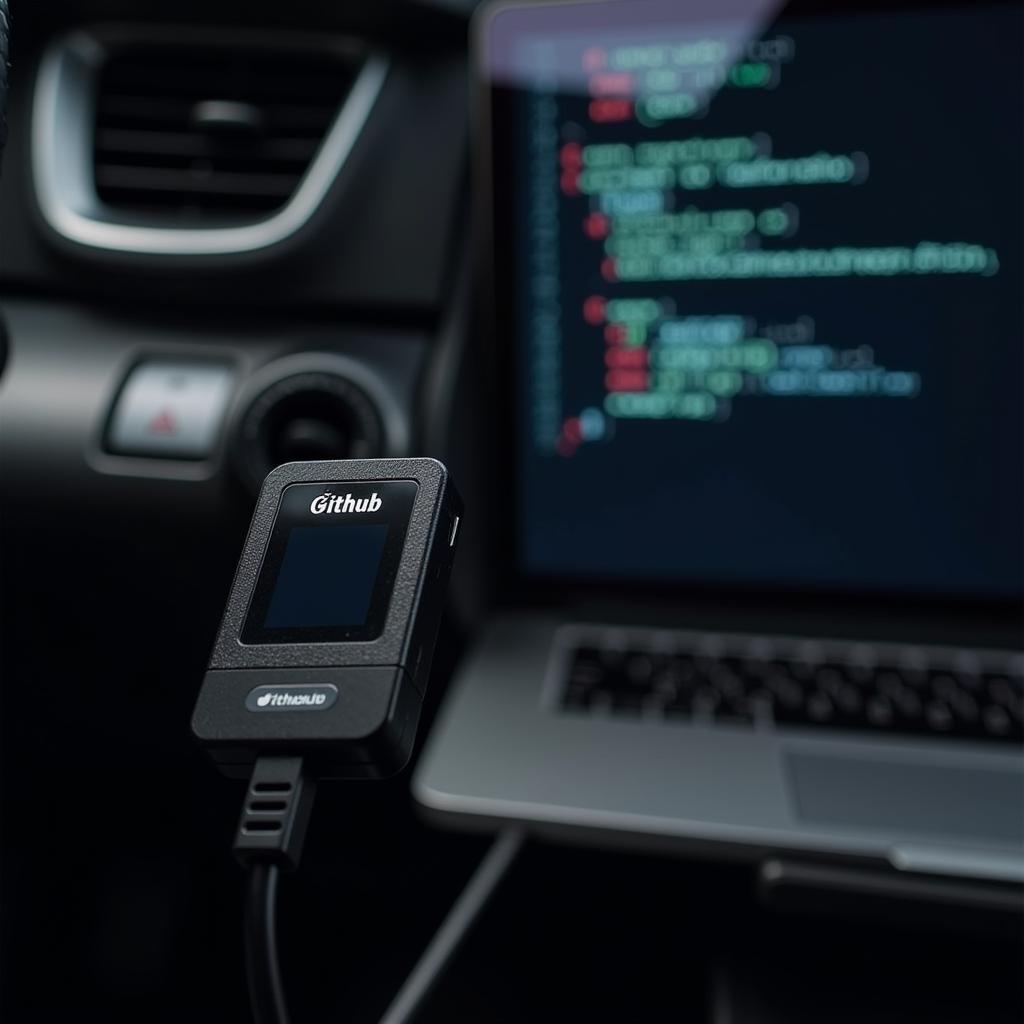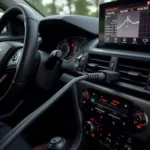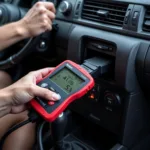The world of car diagnostics has been revolutionized by the On-Board Diagnostics (OBD2) interface, a standardized system allowing you to tap into your vehicle’s inner workings. By combining the power of OBD2 with the open-source platform Github, car enthusiasts and developers have opened up a new realm of possibilities for understanding and interacting with their vehicles. This article will delve into the synergy of OBD2 and Github, exploring the potential it holds for vehicle diagnostics, data analysis, and custom applications.
Understanding OBD2 and its Data Riches
Before we dive into the Github aspect, let’s recap what OBD2 brings to the table. Found under the dashboard of most cars manufactured after 1996, the OBD2 port serves as a gateway to a treasure trove of vehicle information. By connecting a compatible device, often an OBD2 scanner, you gain access to real-time data from various sensors monitoring your engine’s performance, emissions, and other crucial systems.
This data, ranging from engine RPM and coolant temperature to fuel system status and oxygen sensor readings, provides valuable insights into your vehicle’s health and performance. Traditionally, this information was primarily utilized by mechanics for diagnostics and repair. However, the rise of affordable OBD2 scanners and the increasing accessibility of information have empowered car owners to take a more proactive approach to vehicle maintenance and even explore customization options.
Github: Where OBD2 Projects Come to Life
Enter Github, a web-based platform that has become synonymous with collaborative software development and open-source projects. At its core, Github provides a version control system allowing multiple developers to work on the same codebase simultaneously, tracking changes and facilitating seamless collaboration. Beyond its version control capabilities, Github has evolved into a thriving community where developers share code, collaborate on projects, and contribute to a vast library of open-source software.
For OBD2 enthusiasts, Github acts as a central hub where they can find a wealth of resources and projects dedicated to leveraging car data. From software libraries and tools for interfacing with OBD2 devices to complete applications for data logging, performance monitoring, and even custom car hacks, the possibilities are vast.
Benefits of Combining OBD2 and Github
The synergy between OBD2 and Github unlocks a range of benefits for car owners, hobbyists, and developers alike:
1. Cost-Effective Solutions: Open-source software and hardware projects on Github often offer cost-effective alternatives to expensive commercial options. By leveraging community-driven initiatives, you can access powerful tools and resources without breaking the bank.
2. Customization and Flexibility: Github grants you access to the source code of OBD2 projects, enabling customization and tailoring to your specific needs. Whether you want to build a custom dashboard display, develop a unique data logging application, or experiment with vehicle control, Github provides the flexibility to do so.
3. Community Support and Collaboration: The Github community thrives on collaboration and knowledge sharing. If you encounter challenges or have questions, a vast network of developers and enthusiasts is readily available to assist you through forums, discussions, and direct contributions to projects.
4. Enhanced Vehicle Understanding: By delving into the world of OBD2 and Github, you gain a deeper understanding of your vehicle’s inner workings. Analyzing data, experimenting with projects, and engaging with the community empowers you to become a more informed and capable car owner.
Exploring OBD2 Projects on Github
Navigating the vast landscape of Github can seem daunting at first, but numerous resources and projects cater specifically to OBD2 enthusiasts. Here are some key areas to explore:
-
OBD2 Libraries and APIs: Numerous open-source libraries and APIs simplify the process of connecting to and communicating with OBD2 devices. These libraries abstract away the complexities of low-level communication protocols, allowing you to focus on data retrieval and application development.
-
Data Logging and Analysis Tools: Github hosts various projects dedicated to logging, visualizing, and analyzing OBD2 data. These tools range from simple command-line utilities to sophisticated dashboards and applications providing real-time insights into vehicle performance.
-
Custom Applications and Hacks: The creative potential of combining OBD2 and Github knows no bounds. Projects range from building custom gauge clusters and head-up displays to integrating vehicle data with smartphones and other devices.
Getting Started with OBD2 and Github
Embarking on your OBD2 and Github journey is easier than you might think. Here’s a basic roadmap to get you started:
-
Choose an OBD2 Scanner: Selecting a compatible OBD2 scanner is crucial. Consider factors like wired vs. wireless connectivity, supported communication protocols, and data logging capabilities.
-
Explore Github Repositories: Begin by exploring Github repositories dedicated to OBD2 projects. Use relevant keywords like “OBD2,” “ELM327” (a common OBD2 communication protocol), or specific project names.
-
Start with Beginner-Friendly Projects: Look for projects explicitly labeled as beginner-friendly or those with comprehensive documentation and active communities. These projects provide a gentle learning curve and ample support as you familiarize yourself with the concepts.
-
Experiment and Contribute: Don’t hesitate to experiment with different projects, modify existing code, and share your creations with the community. Contributing to open-source projects, even in small ways, helps foster innovation and benefits everyone involved.
Conclusion
The fusion of OBD2 and Github has ushered in a new era of vehicle diagnostics and customization. By embracing the power of open-source development and tapping into the collective knowledge of the Github community, car enthusiasts and developers can unlock a world of possibilities for understanding, interacting with, and enhancing their vehicles. Whether you’re a seasoned mechanic, a passionate hobbyist, or a curious car owner, the OBD2 and Github duo offers an exciting frontier to explore and innovate within the automotive realm.


